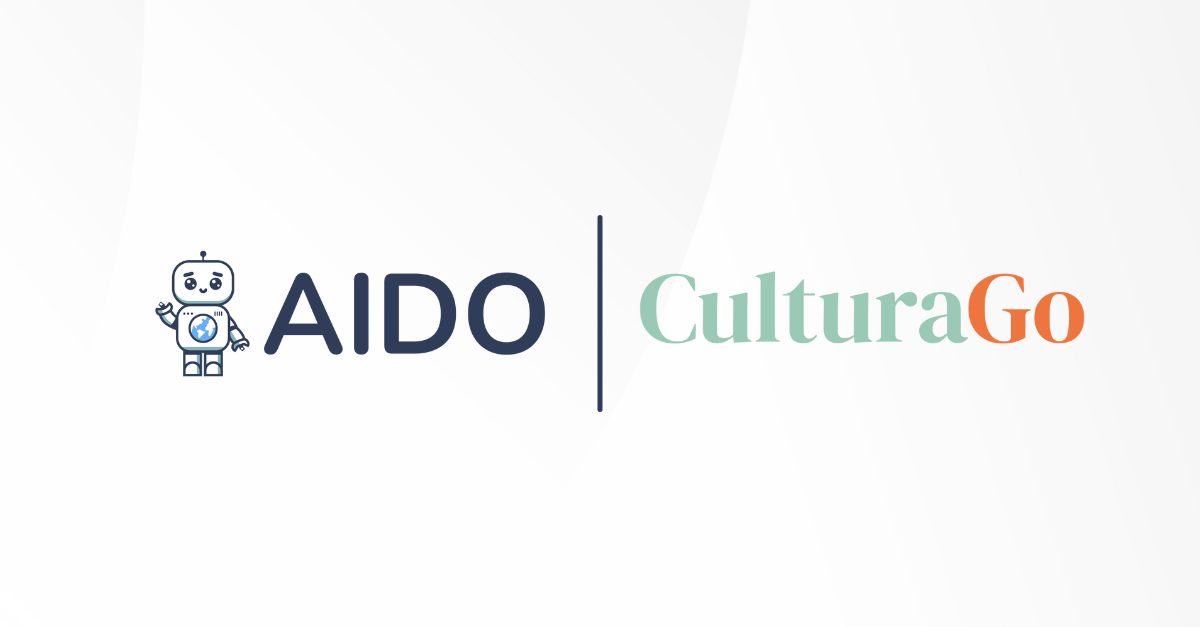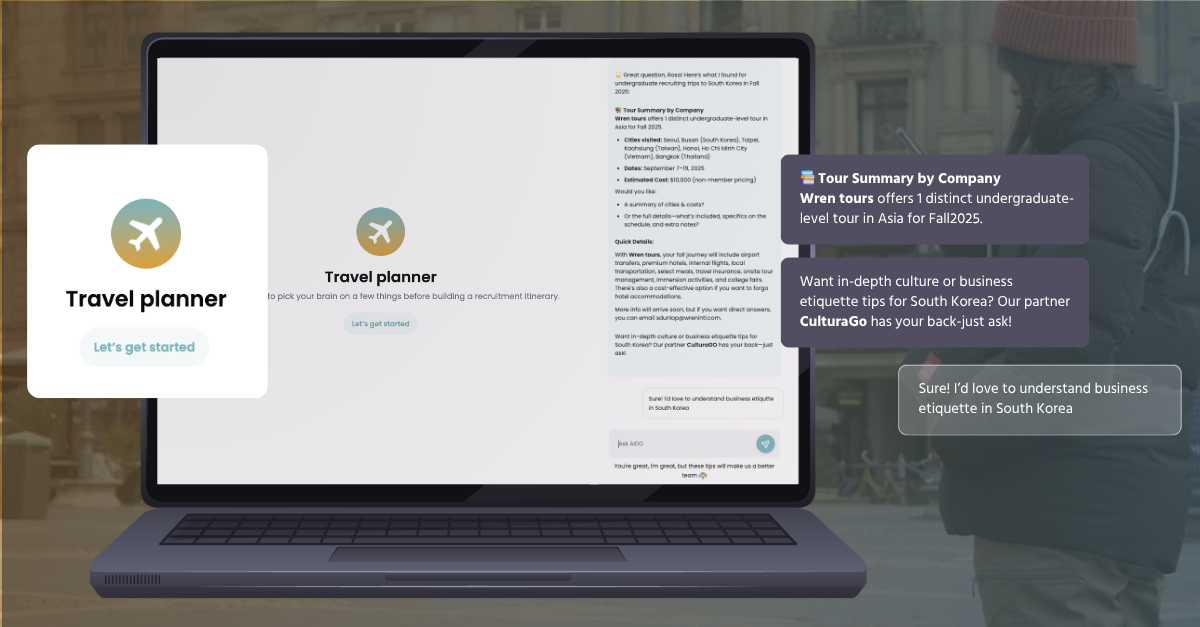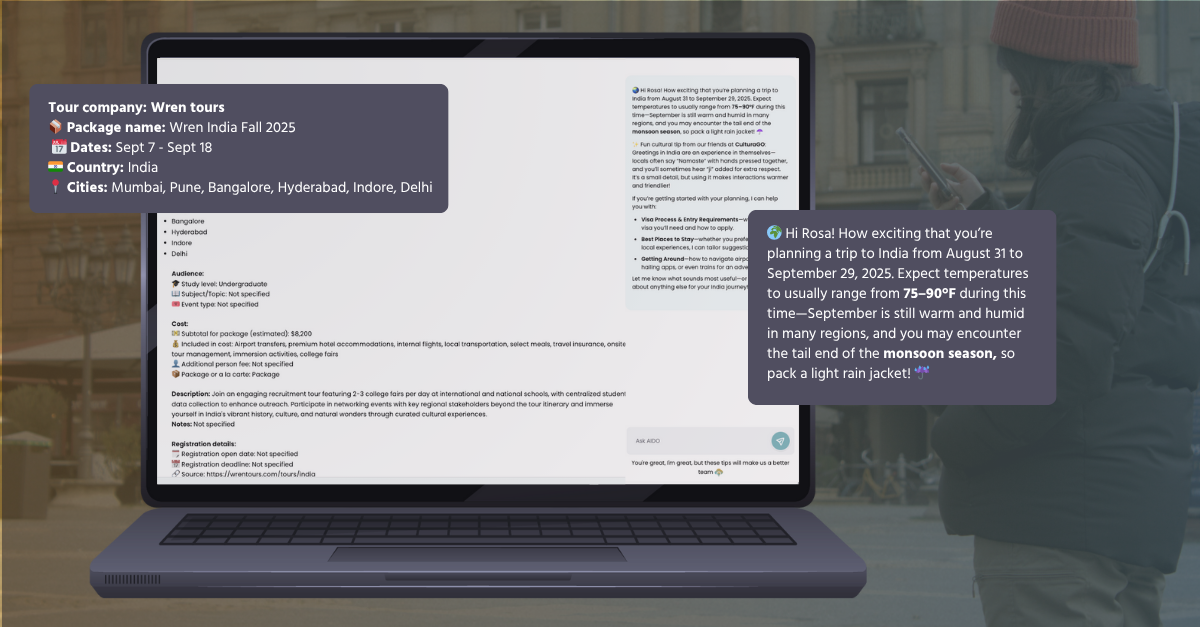💥🚀 Now accepting early access partners. Join the waitlist to be among the first institutions using AIDO at preferred pricing.
AIDO is growing and we’re sharing the journey as it happens. This is where you’ll find all our latest announcements, updates, partnerships, media mentions, and occasional thoughts on where international enrollment is heading. Not quite a blog, not just a news feed, just the important stuff, when it happens.
October 13, 2025

Political instability, rising costs, and yet another round of budget cuts leave enrollment leaders asking: Is international travel even worth it this year?
At AIDO, we believe the answer is yes, but only if you stop relying on the old flight plan.
For years, recruitment travel has been built on habit. You pull up last year’s spreadsheet, call a few peers, and book the same fairs and school visits you’ve always done. But the landscape has shifted:
Following a dead flight plan means you’re wasting precious miles and missing emerging opportunities.
AIDO’s Travel Planner consolidates hundreds of global fairs and tours, from QS to BMI to EducationUSA, into a single, filterable table and map view.
From there, instead of relying on instinct, you get:
In this practitioner’s guide, we invited Greg Holz, Assistant Director for Global Engagement at the University of Central Missouri, to share how AI is transforming how enrollment teams plan international travel—from fairs to funnels.
Travel isn’t going away. COVID proved that even when digital tools are at their peak, students and families still want human connection. Meeting a university representative face to face gives students confidence in their choices and reassures parents they’re making the right decision. In-person recruitment will remain essential for the foreseeable future.
But it’s also one of the most expensive tools in a recruiter’s kit, which means every trip has to earn its keep. The best practice isn’t necessarily going where you’ve always gone; it’s asking where you’ll get the most return for the effort. And I’ve found AI to be central to that work.
Airlines already use AI to set prices. Travel platforms are building it into search and booking. The models keep getting more complex and more capable. Every day it seems to be more and more apparent that AI is becoming a part of so many tools we use in our daily lives, and I’ve begun incorporating many of these tools into my recruitment planning. You can look at AI tools in a couple of different ways.
General-purpose AI tools like ChatGPT and Perplexity have become my go-to for broad industry research and content building. I use them for everything from understanding cultural nuances to researching local education policies.
But emerging specialized platforms are where we are likely to see the biggest impact. These tools are built for our world. They don’t just gather data, they interpret it, highlight market shifts, and make actionable recommendations. There are even AI tools now that tie into a CRM, letting me benchmark against our own funnel while layering in external context. And that context matters. These platforms can draw from sources like Open Doors and SEVIS for hard numbers, then add depth with insights from Intead, ICEF, and NAFSA. The result is a clearer picture, grounded in data instead of assumptions, and sharper decisions about where to focus effort.
For me, accessing this kind of analysis has been like skipping years of trial and error that I watch colleagues go through. It’s given me sharper focus and more confidence in every decision. I use generalist tools for background reading and building content, but specialists set my direction. Which is why instead of casting guesses, I can zero in on the regions, countries, and cities that matter most.
AI also helps me think not only about where I’m traveling, but how to maximize impact once I’m there. I love following EducationUSA circuits, and those serve as Anchor Events for many of my trips. I call these Anchor Events because they hold a trip in place and give structure to everything else. Every recruiter has their own: BMI events, AEO Tours, KIC Univassist, or larger gatherings like ICEF and International ACAC.
This isn’t an either/or that forces me to abandon my favorite events and connections. It’s a both/and. Some of the specialist AI tools (like AIDO) allow me to design travel around these Anchor Events, those tentpoles that hold a trip together, and then layer in nearby opportunities for maximum ROI. No hours of side research. No days lost to replanning. AI enables me to build efficient, high-ROI travel around the events I value most.
The impact goes beyond smarter travel planning. AI tools that integrate directly with our CRM allow me to benchmark against our own funnel and compare to external data like Open Doors and SEVIS. The AI models can interpret data, surface market signals, and even recommend actions. This has fundamentally changed how I approach leadership conversations.
When I walk into leadership meetings now with AI-backed analysis, the entire dynamic shifts. I’m not showing up with a wish list; I’m showing up with a strategy.”
In planning and budget meetings, I’m no longer defending past practices; I’m influencing future direction. Leaders listen differently when a plan is backed by hard data and industry insight instead of tradition and hunches. Now I can walk in aligned and walk out with buy-in.
The bottom line is this: I don’t think AI is optional anymore. The world is making it necessary. When times are tough, we either keep doing things the old way and steadily decline or we learn to get lean and efficient.
And yes, I’m going to own my nerd card here. Isaac Asimov said it best in Foundation. Hober Mallow pointed out that scarcity forced his society to innovate, shrinking what once required massive buildings into a pocket-sized nuclear reactor and force field. And if you don’t quite get the reference, read the books, they’re good. Just don’t confuse them with the Apple TV reinterpretation.
I think International Enrollment Management is facing its own version of that moment. We don’t have the luxury of bloated budgets and endless travel anymore. I’ve had to shift perspective, embrace AI—generalist and specialist alike—as the force pushing me toward leaner, smarter recruitment. Those of us who build AI into our strategy now won’t just keep moving when the political winds shift. We’ll be positioned to thrive.
Travel will always be about relationships. AI doesn’t replace the human connection; it ensures you’re showing up in the right places, at the right time, with the right context.
Use AI to get you there, and the human connection to get students here.
When leadership asks, “Is this trip worth it?” you’ll have the data-backed navigation guide in hand. Because in today’s world, every flight, every fair, and every meeting must earn its keep.
October 2, 2025

The field of international education is in constant motion, and its leaders are being asked to move faster and adapt more than ever before. At the center of this change is Clare Overmann, the new CEO of the Association of International Education Administrators (AIEA).
What makes Clare stand out is not a rigid “grand plan,” but her willingness to lead with honesty, adaptability, and vision. In a field that feels like it needs to move faster and faster, she brings a refreshing mix of humility and boldness.
Clare admitted she almost didn’t apply for the CEO position, expecting the association to pursue a well-known figure with long-established credentials. But as she reviewed the job description, her hesitation shifted.
“I was even a little bit skeptical that I should throw my hat in the ring. I thought they would be looking for someone with more direct SIO experience”
That candid acknowledgment of imposter syndrome, paired with her decision to step forward anyway, set the tone for her leadership. It revealed someone motivated less by title and more by the opportunity to make an impact.
Since stepping into the role, Clare has been clear about where AIEA must grow. She’d like to see “more programming, more services, more visibility, more action.” Her vision includes expanding beyond the comfort of the annual North American meeting, taking AIEA “on the road” with regional and global gatherings, and ensuring the association is the place where big conversations, about advocacy, technology, and the future of the field – actually happen.
Asked to expand on her vision, Clare didn’t roll out a tightly scripted plan. Instead, she emphasized adaptability. She explained that she doesn’t believe progress comes from rigid frameworks, but from the ability to respond to circumstances as they unfold.
“I don’t have a grand plan. The plan is always changing, it has to, because the world is changing. What I do have are core tenets: relevance, sustainability, visibility.”
This evolving approach extends to how she defines leadership itself. Historically, AIEA has been the home of senior international officers (SIOs). Clare believes it’s time to broaden the tent. “Limiting ourselves only to a certain title, or only to higher education institutions, is just a limiting factor. We have to be more expansive about who is part of this ecosystem.” Enrollment professionals, she added, are critical voices who must be at the strategic table.
Clare also reflected on how higher education approaches technology compared to other sectors. While some industries race ahead, she acknowledged that international education often moves more cautiously.
“If some industries are the rabbit, higher ed is the middle road — and we’re kind of bringing up the rear. But that means we have the opportunity to leapfrog.”
It’s a compelling reminder that being a late adopter doesn’t have to mean falling behind. By skipping over incremental steps and embracing tools that are already mature, associations and institutions can move faster than they think.
That mindset is particularly relevant as artificial intelligence tools become central to international enrollment. Rather than layering on more fragmented systems, Clare’s perspective points to the chance to consolidate and leap forward. It’s an idea that resonates closely with AIDO’s mission: giving enrollment leaders a way to bypass outdated processes and step directly into smarter, more connected decision-making.
Partnerships are central to this future. Rather than building in isolation, Clare is committed to collaboration. “Partnership, partnership, partnership. Do everything in partnership. There’s no need to recreate the wheel.” By working side by side with institutions, peer associations, and even private sector partners, AIEA can amplify its impact without duplicating effort.
What struck us most in our conversation was how naturally Clare’s philosophy aligned with AIDO’s mission. Her conviction about knowledge-sharing echoed the principles AIDO was founded on.
“We are a relatively small field… there’s just no room for not democratizing this stuff. Open access to opportunity and knowledge is the only way we move forward.”
That belief in moving forward together rather than staying stagnant was the common thread of the discussion. With leaders like Clare guiding AIEA and innovations like AIDO helping enrollment teams access the insights they need, the future of international education is in good hands, and ready for what comes next. After all, the best plan might just be no plan at all.
August 25, 2025

International enrollment has always been shaped by forces outside the control of universities. But over the last few years, the ground has shifted faster than ever. Visa policies change with little warning. Geopolitical tensions ripple through recruitment markets. Families weigh affordability in the face of economic uncertainty. For enrollment leaders, it can feel like trying to build a strategy on quicksand.
“I feel paralyzed by global politics and student visa uncertainty.”
— Rosa Alvarado, Valparaiso University
It’s a sentiment echoed across campuses — a recognition that while the demand for U.S. education remains strong, the pathways for students to get here are increasingly unpredictable.
Yet even in this climate, leaders aren’t standing still. Instead, they are adapting — rethinking how they plan, where they invest, and what kinds of support they need.
Greg Holz from the University of Central Missouri acknowledged the reality that “we may have a few lean years coming up,” but sees it as an opportunity rather than a setback. For him, the focus now is on improving processes and building a stronger foundation for the future.
At the University of South Florida, Sean Gilmore faces the same global headwinds but resists the temptation to freeze. “Geopolitical uncertainty makes every enrollment cycle harder — but we can’t just freeze,” he explained. Instead, he believes institutions need to contextualize external events against their own funnels, integrating global realities with local data.
Others point to the strain of working within systems that don’t always bend with the times. “Visa delays and U.S. politics create unpredictability, and that makes it hard to commit resources,” noted Phil Hull of the University of Central Missouri. His frustration captures the bind that many institutions face: they are expected to forecast outcomes in an environment where the rules keep changing.
And that’s why agility has become such a critical mindset. As Margarita Parker at the University of South Florida observed, “We have to re-strategize constantly — visa unpredictability and global shifts demand it.” For her, recruitment planning is no longer a once-a-year exercise but an ongoing cycle of adjustment and recalibration.
Across these conversations, a pattern emerges. Schools can’t eliminate uncertainty — but they can build resilience. The institutions finding their footing are doing three things especially well:
Sean Gilmore – University of South Florida
USF placed a representative in Vietnam — a move that began as a gut decision but has grown into one of their most successful diversification strategies. It reduced over reliance on South Asia while opening a new, sustainable pipeline.
Phil Hull – University of Central Missouri
Phil has shifted attention to South America, targeting countries like Ecuador, Argentina, and Colombia. He has also experimented with international dual-credit partnerships, providing new ways for students to access UCM programs even when mobility is uncertain.
Rosa Alvarado – Valparaiso University
Rosa is exploring graduate markets that are open to online or hybrid study. By testing appetite for alternative delivery, Valpo is hedging against visa delays while still extending access to new regions.
Recommendation:
At no time has the world been more mobile. More students are thinking of going to a variety of destinations, and the idea of studying abroad now stretches to include more affordable options. This creates new opportunities for conversations and outreach. The U.S. still has vast capacity to welcome international students, so diversifying now allows institutions to build traction that will pay off even more in the future.
Sean Gilmore – University of South Florida
USF is undergoing a CRM transition to enable stronger lead tracking and better “system-ness” between graduate and undergraduate recruitment efforts — breaking down silos that previously slowed strategy.
Greg Holz – University of Central Missouri
Greg is pushing for AI-powered tools to improve efficiency and data clarity. From credit evaluations to funnel cleaning, he wants to eliminate manual bottlenecks and give his team faster, cleaner insights to guide decisions.
Rosa Alvarado – Valparaiso University
At Valpo, Rosa is rebuilding an international enrollment strategy after years without a sustainable plan. She is intentionally taking right-sized steps: testing in-country representation, grounding decisions in data, and pairing analytics with human connectedness to secure campus buy-in.
Recommendation:
If you are lukewarm on international travel right now (though travel is still critical where possible), investment in people, processes, and systems becomes even more important. Technology must be leveraged in innovative ways — and the tools themselves must also be innovative, designed to genuinely improve productivity, efficiency, and strategic clarity.
Margarita Parker – University of South Florida
Margarita stressed that her team must “re-strategize constantly.” Recruitment planning is no longer an annual exercise — it’s an ongoing process of adjustment and recalibration as visa and political dynamics change.
Greg Holz – University of Central Missouri
Greg approaches agility by rolling out new AI practices gradually. Trial runs and small wins help staff adapt to change without overwhelming them, making it easier to pivot when conditions shift.
Rosa Alvarado – Valparaiso University
Rosa values “follow-up questions” during strategy planning, forcing her team to think beyond initial assumptions throughout the entire cycle. This practice has built a culture of flexibility, where plans evolve alongside market realities.
Recommendation:
International enrollment is not “set it and forget it.” It is a living organism that demands constant attention. Annual planning is just the beginning. Leaders must continuously evaluate how global conditions are impacting their work and be prepared to adjust strategies accordingly. Agility isn’t optional — it’s the defining skill of successful recruitment in this era.
A Path Forward
The turbulence isn’t going away anytime soon. But the voices of today’s enrollment leaders remind us that paralysis isn’t an option. By diversifying, strengthening, and staying agile, institutions can not only endure uncertainty — they can turn it into a catalyst for smarter, more resilient strategies.
Because while the headlines may shift daily, the mission of international enrollment doesn’t. Universities are still working to open doors for students, to keep education a bridge across borders, and to adapt with agility in the stormiest of times.
June 5, 2025

AIDO and CulturaGo Partner to Bring Power Skills and Global Cultural Intelligence to U.S. Institutions’ International Recruitment Planning
[Chicago, Illinois] – [June 5th, 2025] – AIDO, the AI-powered platform transforming international recruitment strategy for U.S. institutions, today announced a strategic partnership with CulturaGo, a global education company redefining career critical power skill development and intercultural training. This collaboration brings together modern technologies with deep cultural and professional development expertise to provide university recruiters with everything they need to navigate global student recruitment – both strategically and compassionately with intention.

Through this long-term partnership, initially CulturaGo’s destination-specific cultural adaptation guides will now be accessible directly within AIDO’s knowledge base, but specifically for its Travel Planner tool. Through the power of AI AIDO enables institutions to discover, through natural language conversation, hundreds of global student recruitment fairs and organize travel itineraries—by region, audience, and budget—all in one platform. With CulturaGo’s insights seamlessly integrated, covering the top 30 student recruitment destinations worldwide, university recruiters will be equipped, not only with ideas of where to go—but how to engage meaningfully once they arrive.
“Universities need more than just logistics when traveling abroad—they need cultural fluency,” said Rishab Malhotra, Founder of AIDO. “Our partnership with CulturaGo gives international enrollment professionals the context, confidence, and cultural competency to represent their institutions effectively, wherever they go.”
The integration addresses a growing need among institutions to prepare staff for new and unfamiliar environments. With CulturaGo’s trusted resources covering everything from local transportation and dining etiquette to professional norms and social customs, institutions can now ensure more confident, respectful, and productive international engagement—all within the AIDO ecosystem.

“At CulturaGo, we believe global education and cross-cultural collaboration is the most opportune time for transferrable skill development.” said Liam Kelly, Founder of CulturaGo. “By partnering with AIDO, we’re embedding our mission into the workflows of the professionals shaping global learning, and scaling cultural intelligence through AI-powered technology.”
The collaboration reflects a shared belief: that democratizing access to data and cultivating empathy for the lived experiences of others is key to building a more connected and competent international education ecosystem. Together, AIDO and CulturaGo are making global connectedness more accessible, insightful, and impactful.
To learn more, visit www.meetaido.com or www.culturago.com.
About AIDO
AIDO is an AI-driven platform built to simplify international enrollment. We equip universities with data, actionable insights, and automation tools to help them make smarter, faster, and more effective international recruitment decisions.
About CulturaGo
CulturaGo was founded in 2019 to transform global education experiences into lifelong skills and opportunities. As technology reshapes the workforce, CulturaGo ensures that global education becomes a powerful driver of personal and professional growth. From The Power Skills Accelerator to destination-specific culture courses, CulturaGo equips students, institutions, and organizations to make every global experience count.